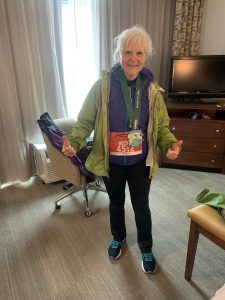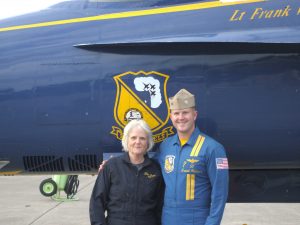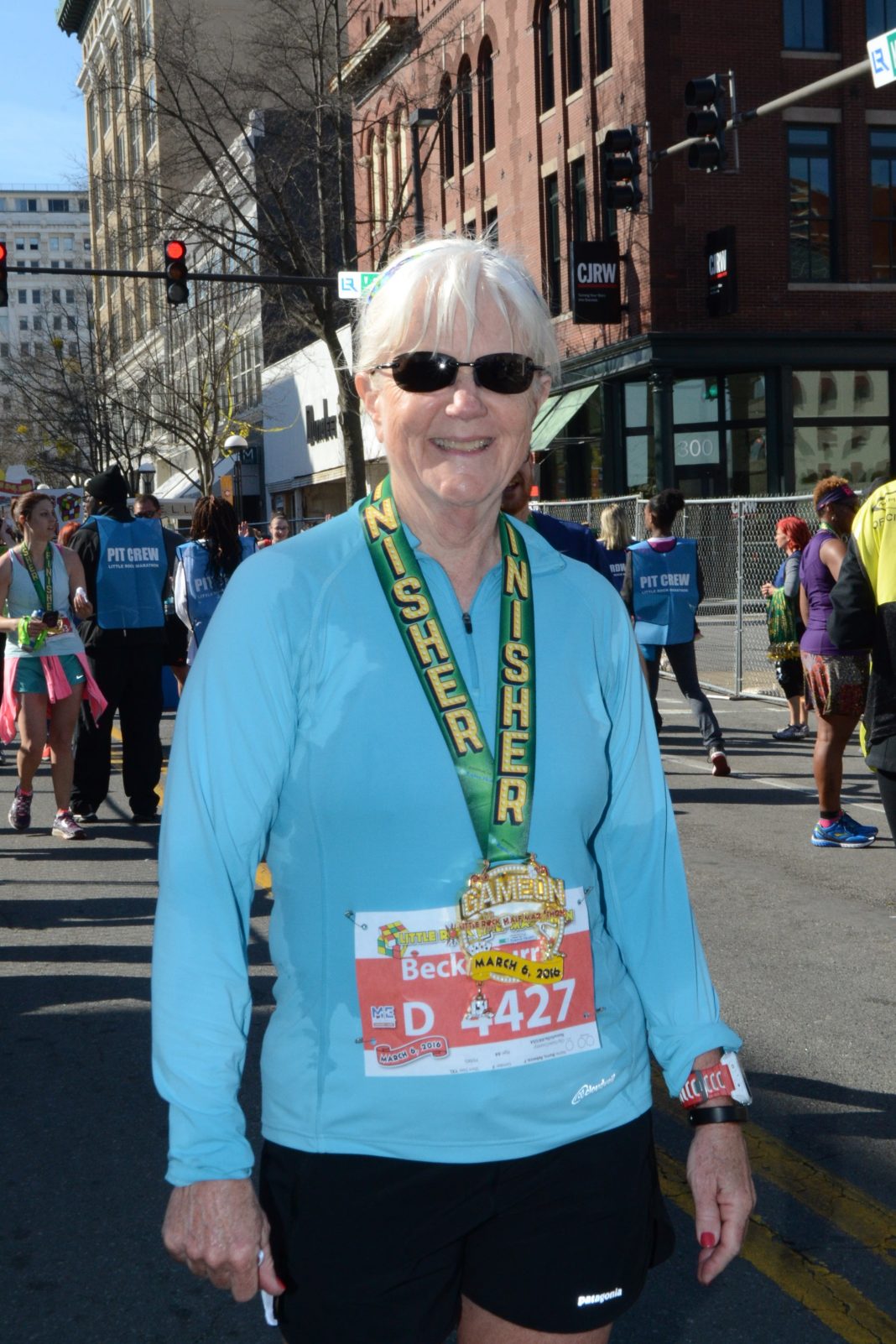Running is more than just something Dr. Rebecca Burris does; it’s part of who she is.
Burris, department head and professor of nursing, will retire at the end of the 2019-2020 academic year after a 30-year career at Arkansas Tech University. When she first sought a teaching position in nursing at ATU, she never imagined she’d someday be overseeing the department.
Beginning her career in Louisiana as a childbirth educator, Burris has always been passionate about helping family units get off to a running start—the best start possible. Later, when Burris wanted to become certified in childbirth education, there were two paths to pursue: teaching or nursing.
“I had always been interested in helping professions, so I decided I was going to go to nursing school,” said Burris. “So that’s how I got into it…to me, there isn’t anything better or more exciting that a nurse can do than help a new family and get their start in life. So that’s just always been special to me.”
Burris worked as a nurse in the obstetrics field for several years and later earned her master’s degree from Northwestern State University in Louisiana.
Already an outdoor enthusiast from a young age, Burris had begun running with a group of mothers to get into shape after childbirth, and the love of running continued as a way to stay healthy while raising her family and accepting the increasing challenges of the nursing field. Soon she was running races and half-marathons in addition to serving on committees to several outdoor-focused organizations. It was through one of these organizations that Burris met her future husband.

“That’s kind of a funny story in itself,” said Burris. “I was a delegate to the American Canoe Association annual meeting, and so was he. We both had a mutual friend, and we were all going together to this event. And so that’s how we met. And that’s how I ended up here [in Russellville]. Interestingly, I spent all my free time in Arkansas back then anyway, because the Ozark society in Bossier City, Shreveport, which is where I was from, did a lot of paddling, hiking, backpacking, all of those kinds of things in Arkansas. So I’m spending all my free time up here anyway. So, it was an easy move. I was very excited and eager, even without the husband.”
After settling down in Russellville, Burris sought out employment at ATU. While there were no open positions at the time of her inquiry, she was soon hired because nursing educators are often hard to find. According to Burris, “many practitioners qualified to teach are married women with families.” Often these professionals relocate based on a spouse’s career as Burris had.
Just a few years after being hired at ATU, Burris excelled all the way to the leadership of the nursing program. Faculty mentors urged her to participate in a new nursing doctoral program at UAMS that began in the mid-1990s—around the time the current nursing department head was due to retire. Having so recently completed her master’s degree, Burris was able to obtain her paper GRE scores from her previous university thanks to a staff member named Beth, who was willing to go the extra mile to help a former student.
Going the extra mile became a motto for Burris throughout her career in more ways than one. She participated in professional development for leadership and was assigned additional mentors to help her transition from teaching into a teaching/administrator role. One of those mentors was Dr. Patricia Thompson, whom Burris had known from the master’s program at Northwestern State. It was a chance encounter that caused Thompson and Burris to cross paths at a conference.
“I didn’t know that [Thompson] had left Louisiana,” said Burris. “And I went to a research conference at UAMS. I kept seeing ‘Dr. Patricia Thompson’ on posters…and it was her. There were two Pat Thompsons, but she was there. She had come from Louisiana, and she became an informal mentor to me. She was on my doctoral dissertation committee.”
Thompson continued to serve as a mentor and inspiration to Burris throughout her career
“She was absolutely my role model,” continued Burris. “[Thompson] could have a meeting, and it would be over in less than an hour, and you would get so much accomplished. The other thing I remember was, she could give a lecture in class for three hours, and you could end up with a page of notes, and somehow it brought everything you needed to know to memory. There were just so many things that I learned from her, and when I had problems here that I didn’t know how to deal with, I could call her and go to Little Rock, and we’d sit down and talk. So, she was career-changing for me.”
Burris was named an American Nurse Foundation Scholar for 1999-2000 as a result of her dissertation. Only 35 scholars were named that year in the United States.
While teaching, Burris most enjoyed classes related to the obstetrics field where she got her start. She also grew to love teaching nursing research. Most recently, she’s enjoyed teaching epidemiology (the study of diseases) in the graduate program. She notes that the new professor for the program in the fall 2020 semester will have a lot of material due to COVID-19 since the class often deals with current events.
As far as the future of nursing education, Burris feels there will be an increase in simulation. Now, mannequin simulation is an expensive but necessary addition to nursing programs.
“Simulation is wonderful,” said Burris. “I mean, it’s not taking care of patients in the hospital, but [the mannequins] can get the students can learn things from simulation that they can’t learn in the hospital setting, and [students] can be exposed to things that are not seen very often [in the clinical setting].”
Though the nursing field is in high demand, Burris cautions students against pursuing it if they don’t have a passion for the caring profession. One of the most challenging aspects of advising students is when she has to convince one that they’re going in the wrong direction.
About these students, Burris said, “Some of them are scared, going to clinical. They’re intimidated, they’re afraid they’re going to hurt the patient or make a mistake, and they don’t make very good nurses either. You want to have a certain amount of that [fear], but if you’re paralyzed and can’t act because you’re so fearful of making a mistake, you’re not going to make it an emergency situation.”
Burris said that most of those students who left the program due to a lack of aptitude for the field became very successful in other areas. It’s a difficult but necessary conversation that Burris feels is warranted when students are not performing well in the nursing curriculum.
While being a nurse prepared Burris for the unexpected, she was still surprised sometimes by events during her tenure at ATU. One day, while working at her desk, Burris was approached by her administrative assistant, the late Carole Horner, about her interest in riding in the Navy’s Blue Angels Jet. The Navy was offering rides to educators that year, and Burris suspected she’d been nominated by “the guys over at McEver.”
“I was really busy,” said Burris. “And [Horner] pushes this piece of paper [that says] ‘The Navy wants to know how tall you are, how much you weigh and if you can run a mile in 10 minutes.'”
All of the running Burris had done during her free time had come in handy.

“There were three of us that had these courtesy flights that day,” continued Burris. “And it was incredible. I have a videotape of it. They had a camera in the cockpit. It was on my face. You can hear everything we said back and forth between the pilot. So, you just never know…and the only reason I got asked was because I was an educator.”
Despite reaching the finish line for her career, Burris plans to do more running. She also plans to pick up the pace with her piano lessons, which Burris admitted she hadn’t played in 51 years when she started back a few months ago.
“There’s a lot of things that I don’t remember [about the piano], but there are things I do,” said Burris. “My fingers remember how to do scales, and it’s been amazing.”






